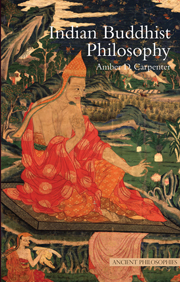Book contents
- Frontmatter
- Contents
- Preface
- Acknowledgements
- Abbreviations
- Chronology
- Development of Buddhist thought in India
- 1 The Buddha's suffering
- 2 Practice and theory of no-self
- 3 Kleśas and compassion
- 4 The second Buddha's greater vehicle
- 5 Karmic questions
- 6 Irresponsible selves, responsible non-selves
- 7 The third turning: Yogācāra
- 8 The long sixth to seventh century: epistemology as ethics
- Epilogue
- Background information
- Appendix 1 The languages of Buddhism
- Appendix 2 Intellectual context
- Appendix 3 The Abhidharma
- Appendix 4 Snapshot of Indian philosophy
- Notes
- Bibliography
- Index
Appendix 4 - Snapshot of Indian philosophy
from Background information
- Frontmatter
- Contents
- Preface
- Acknowledgements
- Abbreviations
- Chronology
- Development of Buddhist thought in India
- 1 The Buddha's suffering
- 2 Practice and theory of no-self
- 3 Kleśas and compassion
- 4 The second Buddha's greater vehicle
- 5 Karmic questions
- 6 Irresponsible selves, responsible non-selves
- 7 The third turning: Yogācāra
- 8 The long sixth to seventh century: epistemology as ethics
- Epilogue
- Background information
- Appendix 1 The languages of Buddhism
- Appendix 2 Intellectual context
- Appendix 3 The Abhidharma
- Appendix 4 Snapshot of Indian philosophy
- Notes
- Bibliography
- Index
Summary
Buddhist philosophy neither grew up nor developed in an intellectual vacuum. As Buddhist philosophers' claims became more systematic and precise, so too did the objections of their non-Buddhist opponents, who were meanwhile developing systematic views of their own. Public debates, sometimes sponsored by local aristocrats and kings, were an important part of the intellectual context. Buddhist and non-Buddhist philosophers alike knew that they had to make their views persuasive to those who did not already agree with them, and made efforts to demonstrate that their respective positions were the most credible to the impartial mind.
The history and development of these philosophical debates and discussions is hard to track precisely. But a common snapshot overview of the main participants in philosophical discussion over a period of more than two millennia lists six recognized Brahmanical schools. Each school has its own foundational sūtra, setting out the domain of concern and the main principles of that discipline. Such divisions can tend to mark a difference in interest and emphasis, rather than outright competing philosophical systems – although they often disagree with each other on particular points, they also often work co-operatively on the philosophical enterprise. To a certain extent, the divisions are sometimes not unlike the distinctions in contemporary analytic philosophy between, say, epistemology, metaphysics, phenomenology, applied ethics, and so on.
- Type
- Chapter
- Information
- Indian Buddhist Philosophy , pp. 248 - 250Publisher: Acumen PublishingPrint publication year: 2013



